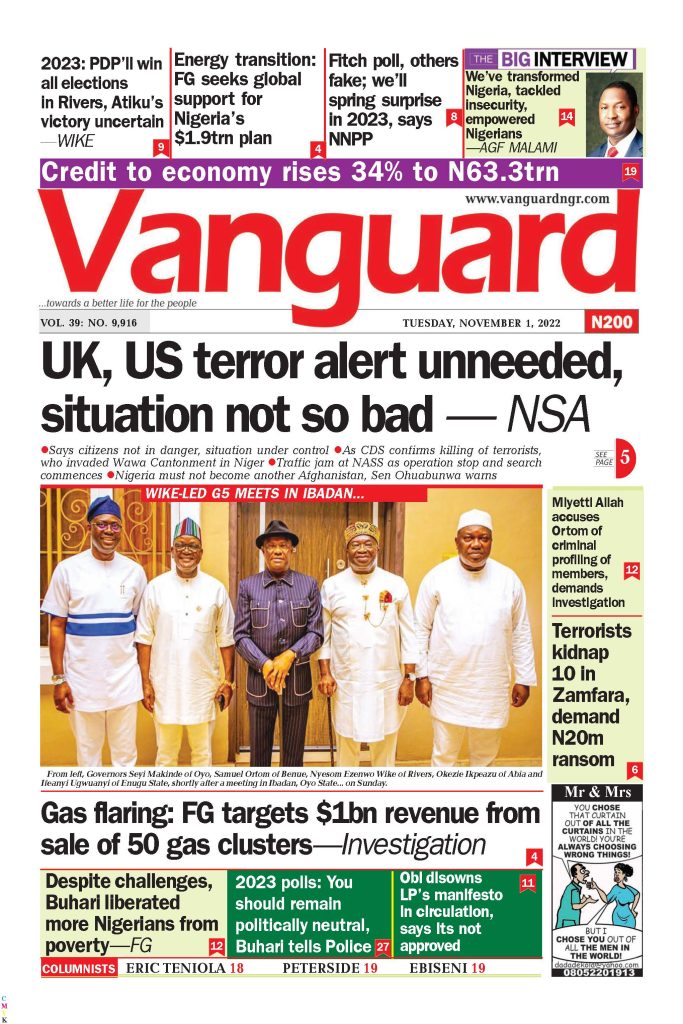
By Nnamdi Ojiego
T anwa Ashiru is a U.S Air Force veteran with over 14 years of experience in intelligence analysis, working in the U.S Department of Defense, DoD, and the U.S National Security Agency, NSA. She served 180 days in Afghanistan and was involved in counter-insurgency, counter IED and counter-terrorism operations in Southwest Asia, Middle East and Africa.
She holds an M.A in intelligence studies from the School of Security and Global Studies at American Military University, AMU, West Virginia, US.
In this interview, the founder of Bulwark Intelligence Solutions, a top security consulting and risk management company in Africa, explains her roles in counter terrorism, women involvement in security operations, the place of technology and training and how her company is rendering services and training for several local and international corporations including the North Atlantic Treaty Organization, NATO, the Nigerian Defense Intelligence Agency, DIA, Nigerian Navy SBS, Nigerian Customs Service, U.S Army Africa Forces, USARAF, Department of State Service, DSS, Halogen Security, Lagos State Emergency Management Agency, LASEMA, Nigeria Police and the U.S Embassy in Nigeria among others. Excerpts:
How did you find yourself in this male-dominated industry, security? Was it by choice or by accident?
I joined the U.S. Air Force at the age of 17. My older siblings similarly started their careers, so it was a relatively easy decision for me to make. Most militaries around the world have a higher percentage of males than females. And several service personnel go into defense contracting and the security industry after service. I did the same, and that is how I ended up in a male-dominated industry.
Why security? What motivated you into making your choice?
There are many reasons people join the military. There are so many incentives and benefits in doing so while serving and after service. My key motivation was education. The military was going to pay for my university education, and that encouraged me to join. After my service, I relocated back home to Nigeria. Once people found out what my background was, I was constantly being steered back to defense and security. What people don’t realize is that security and defense (military) are different concepts. It is not an easy transition to go from military to private security. There is a learning curve that takes place as the language and engagement styles are different. It took a little while, but I eventually made that transition.
If you were to make the choice all over again, would you still choose security as a career?
Probably not! I would take my math classes more seriously and end up in investment banking and trading stocks on Wall Street because these finance guys seem to be the ones making all the money! (Laughs). All jokes aside, if I had a chance to do it all again, I would focus more on tech and cyber security. As the world becomes more dependent on cyberspace for conducting business transactions and daily operations, there is an increasing need to protect that domain. This means cyber security is now just as important as physical security. Anyone going into the defense or security industry today must ensure they understand information and cyber security as well if they plan to remain relevant in the years to come.
You have been involved in counter-terrorism operations in Asia, the Middle East and Africa. From your experience, how best can Nigeria combat and win the war against banditry, insurgency and terrorism?
My role in counter-terrorism was primarily intelligence analysis. I saw how important it was for everyone, from the war fighter in the field, all the way up to the general at the headquarters, to have access to credible intelligence. This ensured they were making decisions from a place of knowledge, which gave them an added advantage. Intelligence is proactive. Much of how we operate in Nigeria is reactive and not proactive. One of the key ways to combat the various adversarial threats Nigeria is dealing with is by focusing on strong intelligence operations. Intelligence allows the war fighter to understand everything about the enemy, and effectively identify who, what, and where to target, to have the desired impact. Also, because we are dealing with asymmetric warfare in the cases of banditry and insurgency, the role of the population is key in tackling the issue. Possessing a military force with an effective and healthy military-civilian interaction is required to tackle the current threats the country faces.
You initiated the Nigerian-American Veteran’s Association, NAVA. What’s the rationale behind the establishment of this group?
After I moved back to Nigeria, I kept running into and kept being told about people of Nigerian descent who had served in the U.S. military. So, we formed an informal group where we could catch up, share stories, and offer our opinions on topics that we considered relevant. One of the best things about this group is that it allows us to converse with people who have similar mindsets and understanding because we have shared experiences.
How is NAVA contributing to solving the security challenges in the country?
We are always happy to share some of the knowledge we gained from serving in the military with our fellow military, law enforcement, and even the local populations. In the past, we’ve put together, care packages (bags filled with goodies and provisions) which we sent to Nigerian Army personnel who were fighting in Borno State. We’ve also provided civilian lifesaver training to members of the Nigeria Immigration Service in Lagos, which was delivered by a NAVA Vet who worked as a combat medic during his time in the U.S Army. This training is designed to increase survivability during an emergency, by teaching non-medic personnel moderate emergency medical care they can provide at the point of injury.
We’ve conducted human terrain analysis training for trainees of the Nigerian Navy SBS to show them how to collect information about the local demographics and build up a socio-cultural database that can be used to advise the leadership about how the local population in an area will respond to any military activities. There is still a whole lot more that we can offer. NAVA Vets have experience in setting up Female Engagement Teams who help increase cultural awareness as a means of combating insurgencies. We can provide imagery (geospatial) intelligence training, ground interdiction training, and lots more. Here’s what is most challenging: the lower-ranking personnel require this training; they request it and are always happy to receive it. On the other hand, the high-ranking personnel in charge of approving training are not as forthcoming. Training opportunities, even when they are free, are often neglected. So, until that disconnect is fixed, Nigeria will have a hard time benefiting from the knowledge global military veterans of Nigerian descent have to offer.
What’s the place of training and technology in tackling insecurity?
Both are very important. Technology provides a major advantage in security and defense. It allows 5D techniques (deter, detect, deny, delay and defend) to be deployed without putting the lives of the war fighters in direct danger. Technology also allows for a targeted response, meaning, you know exactly who, what, and where the threat is, and you can focus your resources on that, without incurring excessive collateral damage. Training is equally important because new techniques and technologies are constantly being introduced in the security and defense industry. Those involved in responding to threats must be aware of what new tools, tactics, and strategies are available and effective. That is what training and capacity building is all about.
You are the founder and CEO of Bulwark Intelligence Solutions. Tell us your story of successes and nightmares at Bulwark.
I set up Bulwark Intelligence Solutions shortly after I had my second child. I was actively looking for employment but seemed to have a hard time securing a job in the industry and sector. My husband told me not to give up and encouraged me to still put my skills to use. I began writing analysis reports on the northeast insurgency, the use of explosive devices, and how to counter them. Shortly after, I started getting contacted by various groups, organizations, and even government agencies to consult on and provide solutions to their security challenges.
READ ALSO:
That was how Bulwark Intelligence began. Today, our organization provides enterprise security risk management services to both private and public sector clients. These services range from security risk assessments, threat advisory, intelligence reports, investigations, and training, to defense, intelligence, and security consultation.
There have been many highs and surreal moments. I remember once having to brief a room full of Nigerian military generals in a room that was uniquely designed to intimidate everyone except the person in the big chair. But I found it thrilling and exciting. I’ve also provided training and lectures to a room full of NATO military officers at the NATO School in Germany and conducted presentations at the UK Ministry of Defense, London. Today, we provide services to major multinational companies not just in Nigeria, but across other West and Central African countries. We have English, French, and Portuguese speaking analysts as part of our team.
How does it feel like founding and managing one of the top security firms in the country?
I always have to remind myself to be thankful for how far we’ve come. It has been quite a journey, filled with so many ups and downs. But the goal has always been to just keep going and keep doing the right thing. Respect is earned in our industry. I am just thankful that, as the years have progressed, my colleagues and clients have come to value what we bring to the table.
Do you at any point in time, feel overwhelmed, or think of quitting?
It is not overwhelming, but it can be demanding, particularly when dealing with public sector clients. We have brought solutions that we know will effectively solve a problem at a reasonable cost several times. However, approvals are routinely delayed owing to red tape and, in rare circumstances, overlooked due to personal interest. To be honest, it has made me focus more on private sector clients who understand value and capability.
Recently, you chaired the committee that organized the first Women in Security, WIS, Conference in Lagos. Tell us about the conference and what you intend to achieve?
Yes, we had our first Women in Security Conference in November 2021, and it was a resounding success. More and more women have begun entering the global security industry in recent years, and many of these women are being promoted to senior-level positions and are emerging as thought leaders, experts, and specialists, which is shifting the balance of power. There are many reasons for this recent shift, including the fact that the security industry is moving from commodity-based sales to a technology-centric business.
This has allowed for increased diversity and increased participation of women in the workforce. Even with the many opportunities for women in security, we remain underrepresented compared to our male counterparts. However, several industry groups, such as the ASIS International Women in Security Council, have been created to offer community, education, and networking opportunities for women. The Lagos WIS conference sought to provide inspiration, networking, leadership development, and mentorship to women in the security sector by allowing them to hear and learn from game-changers in the industry.
Opportunities for Women
There are so many facets in this industry, ranging from national security, defense and military, intelligence, academia, cyber and private sector enterprise security risk management, among others. I encourage women who are interested in the field to learn more about the various options and go with the ones that interest them and align with their values.
Sustaining the Momentum
The industry and society as a whole still have a long way to go in showing their willingness to accept the voices, opinions, and expertise of women. In the meantime, Women in Security groups will keep doing their part in showing women the various facets of the security industry that are available to them, training them on those skills, building their confidence, and encouraging increased participation. No society can experience lasting peace if they neglect the other 50% of the population. Women in security are well poised to spearhead non-kinetic security operations that will be required to end insecurity across the nation. This should be encouraged and supported by all.









